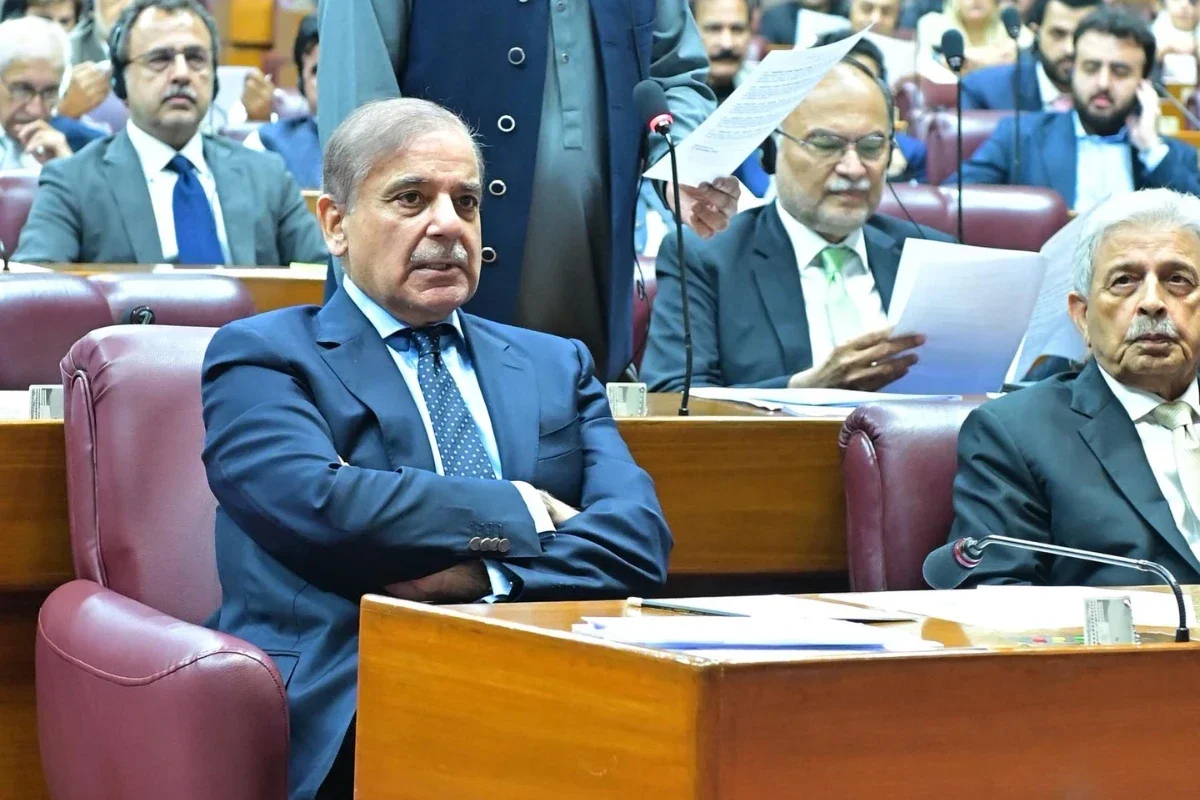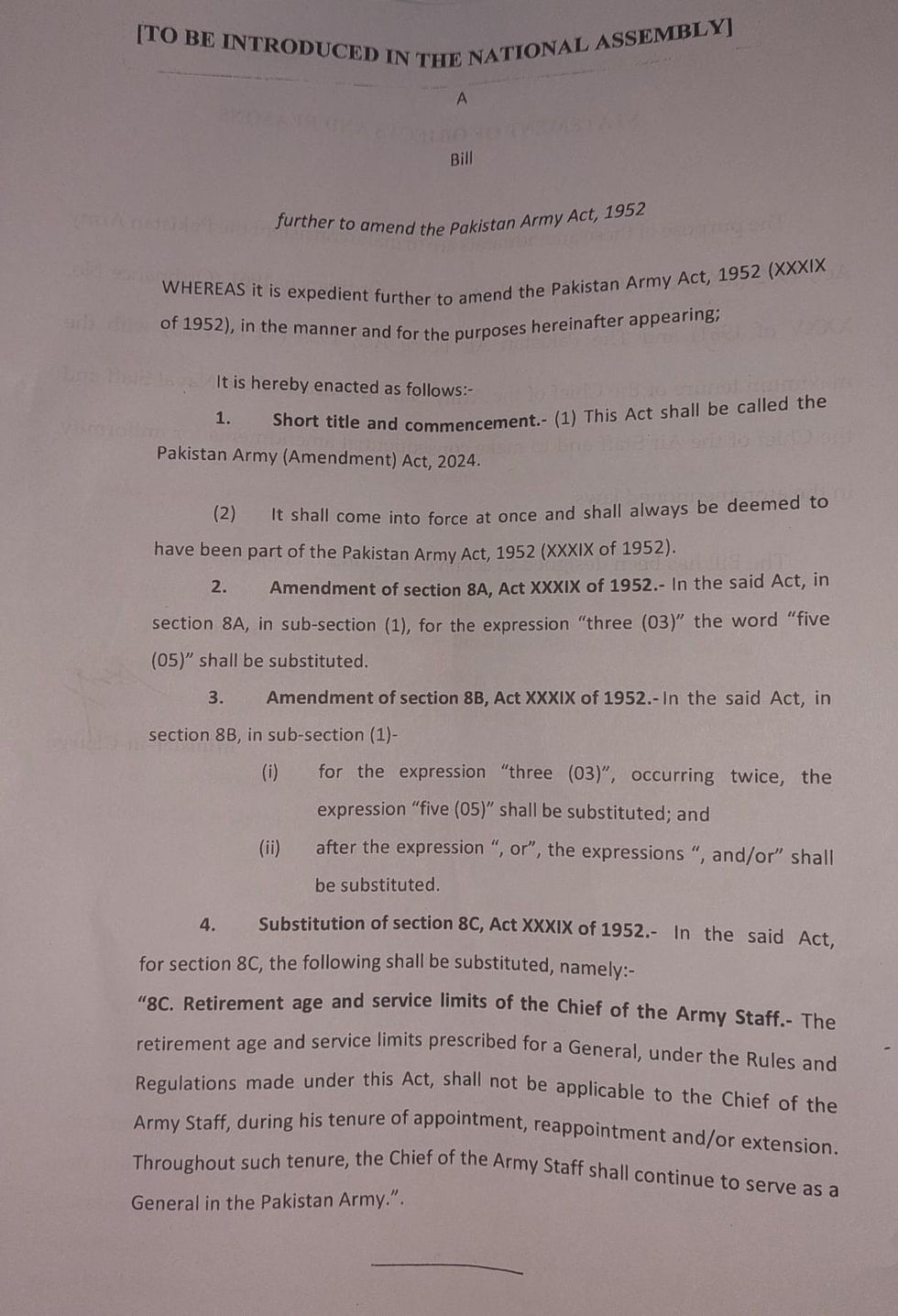Pakistan parliament approves five-year army chief term, expands top judiciary
New bill raises number of Supreme Court judges from 17 to 34, citing need to address a backlog of cases

Javed Hussain
Correspondent
I have almost 20 years of experience in print, radio, and TV media. I started my career with "Daily Jang" after which I got the opportunity to work in FM 103, Radio Pakistan, News One, Ab Tak News, Dawn News TV, Dunya News, 92 News and regional channels Rohi TV, Apna Channel and Sach TV where I worked and gained experience in different areas of all three mediums. My journey from reporting to news anchor in these organisations was excellent. Now, I am working as a correspondent with Nukta in Islamabad, where I get the opportunity of in-depth journalism and storytelling while I am now covering parliamentary affairs, politics, and technology.

Prime Minister Shehbaz Sharif seated in the National Assembly, November 4, 2024.
PID
Parliament passes major amendments to extend army chief’s term to five years and increase number of Supreme Court judges to 34
Opposition vehemently oppose proceedings, protesting against delay of the question period to prioritize the bills
Amid tension, the parliamentary sessions turn chaotic, with several members exchanging heated arguments
Practice and Procedure Amendment Bill 2024 also approved which will introduce procedural changes in Supreme Court, including how benches are selected
Both houses of Pakistan’s Parliament – Senate and National Assembly – on Monday passed major amendments to extend the army chief’s term to five years and increase the number of Supreme Court judges to 34, despite fierce opposition protests.
The army chief's service term will now be extended from three to five years.

Senate proceedings
The Senate passed legislation to expand the Supreme Court's judges and amend the Practice and Procedure Act, following similar approvals in the National Assembly. The session, chaired by Presiding Officer Irfan Haq, included prominent members such as Deputy Prime Minister Senator Ishaq Dar, Finance Minister Muhammad Aurangzeb, Defense Minister Khawaja Asif, and Information Minister Attaullah Tarar.
Federal Law Minister Azam Nazir Tarar presented the bill to increase the number of Supreme Court judges, which was approved by a majority. Tarar later introduced amendments to the Supreme Court Practice and Procedure Act and the Islamabad High Court Act, which were also passed by the upper house.
During the session, opposition members strongly protested, chanting slogans and surrounding the dais. The tense situation led to the deployment of Sergeant-at-Arms. Senators from the Jamiat Ulema-e-Islam-Fazl (JUI-F) joined the opposition in their objections to the legislative changes.
Defense Minister Khawaja Asif also presented amendments to the Pakistan Army Act, which were passed after a vote. Following this, Asif introduced amendments to the Pakistan Air Force Act of 1953 and the Pakistan Navy Ordinance of 1961, both of which were approved by the Senate.
Senator Anusha Rehman introduced an amendment to the State-Owned Enterprises Act of 2023, which was sent to a relevant committee for review. Similarly, Senator Saleem Mandviwalla presented a bill on the restructuring of the National Institute of Health (NIH), which was also forwarded to a standing committee. Rehman later presented a bill on the Evacuee Trust Properties, which Law Minister Tarar recommended be sent to committee.
Senator Samina Mumtaz Zehri proposed an amendment to the Guardians and Wards Act of 1890, which the Senate approved. She also introduced a bill to strengthen anti-trafficking laws.
Commenting on the anti-trafficking bill, Law Minister Tarar noted, "The amendment increases the penalty from five years to life imprisonment. It’s a significant step forward, particularly concerning human rights." Zehri highlighted the seriousness of human trafficking, noting the tragic consequences, including recent incidents involving Pakistani migrants.
The Senate agreed to allocate further time for debate on the bill, with lawmakers expressing a need for stringent measures to address human trafficking and improve the judicial process across Pakistan.
National Assembly session
Earlier in the day, Pakistan’s National Assembly passed major amendments to extend the army chief’s term to five years and increase the number of Supreme Court judges to 34, despite fierce opposition protests.
The army chief's service term will now be extended from three to five years.
Law Minister Azam Nazeer Tarar tabled Supreme Court Judges Expansion Bill 2024 while Defense Minister Khawaja Asif introduced the Army Act Amendment Bill 2024. The former raises the number of Supreme Court judges from 17 to 34, citing the need to address a backlog of cases.
“The expansion will help expedite pending cases and strengthen the judiciary,” Tarar stated during the session.
In addition to the Supreme Court, the assembly approved a separate bill to increase the number of High Court judges from 9 to 12. This measure, aimed at enhancing judicial efficiency, is part of the government’s broader judicial reforms.
Opposition cries foul
The opposition, however, vehemently opposed the proceedings, protesting against the delay of the question period to prioritize the bills.
Opposition members argued that the legislative process was rushed, expressing concerns over transparency.
Amid the tension, the session turned chaotic, with several members exchanging heated arguments.
Practice and Procedure Amendment Bill approved
The National Assembly also approved the Practice and Procedure Amendment Bill 2024, which introduces procedural changes in the Supreme Court, including how benches are selected.
The legislative moves, backed by the ruling Pakistan Muslim League-Nawaz (PML-N), faced backlash from the Pakistan Tehreek-e-Insaf (PTI), main opposition party led by incarcerated Imran Khan.
The National Assembly session was then adjourned to meet again on Tuesday at 11:00 a.m.
With the amendment to the Practice and Procedure Act, Justice Muneeb Akhtar will be removed from the committee again, and the third member will be the senior-most member of any constitutional bench. Until a head is designated for the constitutional bench, the committee will consist of the Chief Justice and the most senior member. If the second member also declines, the Chief Justice may appoint any other judge.
Observers have raised questions about the political motivations behind the amendments. Critics argue that the judicial changes could affect the independence of Pakistan’s judiciary, suggesting potential political influence in the appointments of additional judges.
‘Strengthening judicial system’
Speaking to the media, Federal Law Minister Azam Nazeer Tarar said that Pakistan’s Supreme Court will expand to 34 judges, marking a significant judicial reform aimed at addressing long-standing staffing challenges.
The decision, he explained, comes after careful deliberation and responds to demands from the Supreme Court and High Court Bar Associations.
“The number of Supreme Court judges has been increased to 34 after careful consideration,” Tarar said, adding that the Judicial Commission will determine the exact number needed at any given time, whether it be 16, 20, or 28, based on the court’s requirements. “This move addresses a key demand from the bar associations, as the four court registries have remained understaffed for years,” he noted.
Tarar highlighted the difficulties faced by individuals traveling long distances—from areas like Panjgur, Khuzdar, South Punjab, Dera Ghazi Khan, and Upper Kohistan—to access the Supreme Court in Islamabad. “We must consider those traveling from remote areas,” he said, stressing the importance of making justice accessible for all Pakistanis.
As part of this judicial reform, the Judicial Commission will decide how many judges are required on constitutional benches and registry benches. The law minister also explained that recent amendments allow senior judges to join constitutional benches while maintaining flexibility to take on other duties.
The 26th Constitutional Amendment, Tarar stated, mandates that senior-most judges be included in the committee for constitutional benches, ensuring streamlined work processes across selected judicial streams. “Judges on constitutional benches can handle additional duties alongside their primary responsibilities,” he said, noting that the new committee structure will now include the Chief Justice, the senior-most judge, and the most senior judge on the constitutional benches.
Turning to the Islamabad High Court, Tarar acknowledged the mounting backlog of cases. “With the building issue now resolved, we’ve increased the number of seats from 9 to 12 to address the growing pendency,” he concluded.
This expansion, the law minister stressed, aligns with the government’s commitment to strengthening Pakistan’s judicial system and making justice more accessible nationwide.
PM Shehbaz hails economic progress
Earlier, Prime Minister Shehbaz Sharif, speaking to the Pakistan Muslim League-Nawaz parliamentary party, praised Pakistan's economic recovery, citing reduced inflation and a recent interest rate cut.
"By the grace of Allah and everyone’s efforts, Pakistan’s economy is stabilizing," Shehbaz said. He highlighted the State Bank of Pakistan's decision to cut interest rates by 250 basis points, bringing the rate down from 17.5% to 15%, calling it a positive step for businesses.
"Lower interest rates will boost economic activities, exports, and job opportunities," Shehbaz added, noting that inflation has dropped from 38% to 7%, with both national and international agencies recognizing this stability.
The prime minister condemned those who, he claimed, had tried to destabilize the country. "Those who sought to bring Pakistan to the brink of bankruptcy failed," he remarked, emphasizing that history would remember those who prioritized the country over politics.
Shehbaz also recapped his recent diplomatic visits, including a productive meeting with Saudi Crown Prince Mohammed bin Salman. “Saudi Arabia is a longstanding friend and partner of Pakistan,” he said, sharing that Saudi investment in Pakistan is expected to rise from $2.2 billion to $2.8 billion.
Similarly, during a recent trip to Qatar, Shehbaz said Qatari leaders committed to boosting investment in Pakistan’s aviation, hospitality, IT, and energy sectors, targeting $3 billion for various projects.
In line with the government’s pro-investment policies, Shehbaz outlined initiatives to streamline investment procedures and improve business conditions across sectors. He emphasized ongoing reforms and directed the Federal Board of Revenue (FBR) to honor tax-paying citizens.
“The honest taxpayer is Pakistan’s ambassador,” he noted. Meanwhile, he pledged action against tax evaders and officials aiding them, urging a crackdown to curb tax evasion.
The prime minister also briefed the parliamentary party on upcoming legislative bills in the National Assembly, seeking their support.











Comments
See what people are discussing